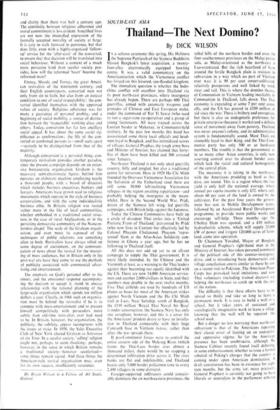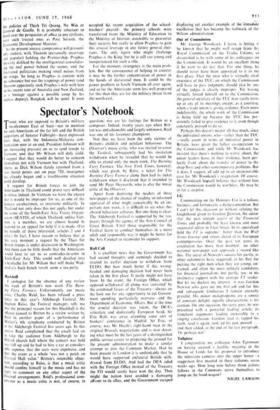SOUTH-EAST ASIA
Thailand The Next Domino?
By DICK WILSON
IN a solemn ceremony this spring, His Holiness the Supreme Patriarch of the Siamese Buddhists blessed Bangkok's latest acquisition, a twenty- four-alley electronically equipped bowling centre. It was a valid commentary on the Americanisation which the Vietnamese conflict has forced on this leisured, sun-flooded kingdom.
The immediate question is whether the Indo- china conflict will overflow into Thailand via its poor north-east provinces, where insurgency has already begun. There are perhaps 600 Thai guerrillas, armed with automatic weapons and grenades of Chinese and East European make, under the command of Yot Ti Sawat (who used to run a sugar-cane co-operative) and a group of young lieutenants. All were trained across the Laotian border at Mahaxay, in Communist-held territory. In the past few months this band has assassinated some thirty local officials and head- men loyal to Bangkok, and has intimidated scores of villages. General Praphas, the tough army boss and Minister of Interior, has claimed that forty- five of them have been killed and 300 arrested since January.
North-east Thailand is not only ideal guerrilla country. hilly and jungled, but also a traditional centre for terrorism. Here in 1929 Ho Chi Minh founded the Overseas Vietnamese Association for the Salvation of the Fatherland (and there are still some 30,000 left-inclining Vietnamese refugees in the region awaiting repatriation—and probably helping the insurgents in the mean- while). Here in the Second World War, Pridi, doyen of the Siamese left wing, led guerrilla campaigns. with British help, against the Japanese.
Today the Chinese Communists have built up a circle of dissident Thai exiles into a 'United Patriotic Front of Thailand,' patronised by Pridi (who now lives in Canton) but effectively led by Colonel Phayum Chulanond. Phayum 'repre- sented' Siam at the Afro-Asian Solidarity con- ference in Ghana a year ago, but he has no following in Thailand itself.
All this does not add up yet to an all-out campaign to topple the Thai government. It is more likely intended, by the Chinese and the Vietminh at least, as a warning to the Thai leaders against their becoming too openly identified with the US. There are now 14,000 American service- men and another 2,000 civilians in Siam, and their numbers may double in the next twelve months. Five Thai airfields are used by hundreds of US planes as bases for most of the American strikes against North Vietnam and the Ho Chi Minh trail in Laos. Near Sattahip. south of Bangkok, the £110 million 'Royal Thai Naval Air Base' is under construction: the Siamese Navy has only one aeroplane, however. and this is a cover for the Americans' prudent desire to have an installa- tion in Thailand comparable with their huge Camranh base in Vietnam before, rather than after, the wai spreads there.
If pro-Communist forces were to control the entire eastern side of the Mekong River (which forms the Thai-Laos border over almost a thousand miles), there would be no stopping a determined infiltration drive across it. The river banks are flat and indefensible, and Thailand boasts only 5.000 border policemen (one to every 2,400 villagers in some districts).
Foreign-supported infiltrators could conceiv- ably dominate the six north-eastern provinces, the
tribal hills of the northern border and even the four southernmost provinces on the Malay penin- sula, as Malay-orientated as the north-east is Lao-orientated. But the rich heartland of Siam around the fertile Bangkok plain is resistant to subversion in a way which no part of Vietnam ever was; it is 90 per cent owner-cultivated, relatively prosperous and well linked by road, river and rail. This is where the domino theory, of Communism in Vietnam leading inevitably to Communism in Thailand, falls down. The Thai economy is expanding at some 7 per cent annu- ally, and the US has poured in £350 million of aid since the war. There is bribery and corruption, but there is also an undogmatic preference for private enterprise (because it works) and a definite sense of movement away from poverty. Thailand was never anyone's colony, and its administrative system is fundamentally sound. Most Thais are staunchly loyal to their King, and the Thai Com- munist party has only 500 or so hard-core members. The trouble is that the government, as in so many other Asian countries, is only now asserting control over its distant border areas which lack the racial and cultural homogeneity of the central plain.
The measures it is taking in the north-east. with the Americans prodding as hard as they dare, are sound. This is a region where the rice yield is only half the national average, where annual per capita income is only £52. where only about 60 per cent of the land is owned by the cultivator. For the past four years the govern- ment has sent in Mobile Development teams, followed by an Accelerated Rural Development programme, to provide more public works and encourage self-help. Three months ago the Ubolrat Dam was opened, and a £10 million hydroelectric scheme, which will supply 25,000 kW of power and irrigate 120,000 acres of farm- land, came into operation.
Dr Chamnarn Yuvabul, Mayor of Bangkok and General Praphas's right-hand man in the Ministry of Interior, has taken personal command of the political side of this counter-insurgency drive, and is introducing basic democracies and village conciliation courts similar to those he saw on a recent visit to Pakistan. The American Peace Corps has provoked local imitations, and now Thai volunteers (including trained doctors) are helping the -north-east to catch up with the rest of the nation.
The difficulty is that these efforts have to be spread so thinly and take so long to leave a permanent mark. It is easy to build a well or a school, but it takes years of sustained and sociologically imaginative work to leave a village knowing that the well will be repaired the school used. But a danger no less worrying than north-east subversion • is that of the Americans repeating their classic error of leaning on an unpopular and oppressive regime. So far the American presence has been unobtrusive, although ffie Siamese Cabinet recently found itself debating. in some embarrassment, whether to issue a formal rebuttal of Peking's charges that the country is coming under open- American domination. A draft constitution has been in existence for eigh- teen months, but the army (or. more precisely. General Praphas) is certainly not going to have liberals or neutralists in the parliament echoing the policies of Thich Tri Quang, Ne Win or General de -.Gaulle. It is probably reluctant to' hand over the perquisites of office to any civilians. even such trusted ones as Pote Sarasin, the Economic Development Minister. So the present uneasy compromise will presue- abb endure, with Thanom (personally incorrupt 3nd popular) holding the Premiership. Praphas (heartily disliked by the intelligentsia) consolidat- ing the real power behind the scenes, and the frustrated politicians making small noises from. the wings. So long as Praphas is content with the substance but not the trappings of power (and Thanom apparently took Praphas's wife with him on his recent tour of Australia and New Zealand, as a hostage against a possible coup by his restless deputy), Bangkok will be quiet. It even
accepted his recent acquisition of the school- teachers' payroll: the primary schools were transferred from the Ministry of Education to the Ministry of Interior, ostensibly to guarantee their security but really to allow Praphas to gain this crucial leverage in any future general elec- tions. The only figure who might challenge Praphas is the King, but he is still too young and inexperienced for such a role.
For the moment, insurgency is the main prob- lem. But the consequence of helping to counter it may be the further concentration of power in the hands of dictatorial men. It could be the power problem in South Vietnam all over again, and so far the Americans seem less well prepared for this than they are for the military threat from the north-east.































 Previous page
Previous page